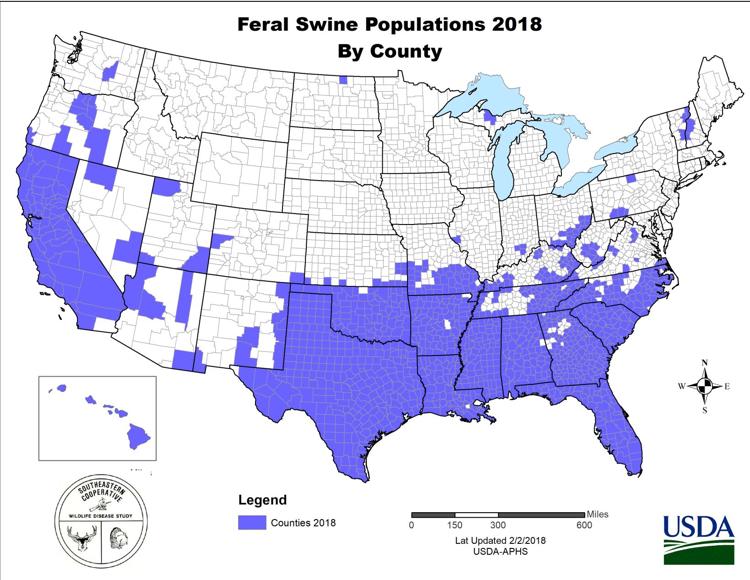by Tristan Baurick for NOLA.com
Snakes, turtles, rabbits, nutria, turkey eggs, turkey babies, baby trees.
Those are among the things state the Louisiana Department of Wildlife and Fisheries scientists recently dug out of the bellies of dead feral hogs from across the state.
The Louisiana Department of Wildlife and Fisheries is studying the stomach contents of wild pigs, an invasive species reviled for the destruction they cause to croplands and the coast’s fragile wetlands. The study isn’t complete, but it’s already hinting that the hairy, tusked hogs may pose an even bigger and broader threat to wildlife than scientists knew.
“We’re finding everything in their stomachs,” said Jim LaCour, a state wildlife veterinarian and feral hog expert. “They’ll eat anything that moves — or doesn’t move. As long as it has some calories to it, they eat it.”
The feral hog menu appears to include imperiled species of salamanders, turtles and shorebirds. Feral hogs are also gobbling up massive quantities of acorns, a food that native animals, including deer, wood ducks and turkeys, depend on during lean winter months.
“They’re in direct competition with species that we value here,” LaCour said.

Feral hogs eat so many acorns and the young oaks that sprout from them that they’ve altered entire forest ecosystems. Along parts of the Pearl River, hogs have consumed so many acorns and oaks that they’ve helped invasive Chinese tallow trees take over.
The Louisiana Department of Wildlife and Fisheries has amassed a collection of about 190 stomachs from hogs killed by hunters and land managers. Scientists have done preliminary inventories — basically picking through the stomachs and noting anything that’s obvious.
“But sometimes it’s not recognizable,” LaCour said. “You might be able to tell the hog’s (eaten) a salamander, but you can’t tell what kind because it’s been ground up by teeth and acted upon by stomach acid.”
The next step would be to order up DNA tests of the stomach contents, but funding for that work was recently shifted to higher-priority research. LaCour estimates it would take a few thousand dollars to finish the study. Until the money materializes, the stomachs will sit in a freezer.
Scientists found plenty of surprises during the initial peeks into pig bellies, but the biggest shocker for LaCour was the massive volume of worms.
“They suck them up like spaghetti,” he said. “And that’s what it looks like in their stomachs — like spaghetti noodles. The worms they do chew up look like SpaghettiOs.”
Feral hogs might win themselves some local fans by chowing down on nutria, a South American rodent that’s also damaging Louisiana’s coastal wetlands. But the study suggests nutria aren’t a mainstay of the hog diet.
About 51% of Louisiana alligator farmers reported hog raids of gator nests, according to a 2012 study that involved Wildlife and Fisheries scientists. Hogs typically eat the entire nest of 25 to 50 eggs.
“They’re valued at $20 or $30 apiece by the farmers,” LaCour said of the eggs. “You do the math.”
Feral hogs, descendants of domestic pigs, are the bane of many farmers. They devour sugar cane, rice and sorghum, causing nearly $80 million in agricultural losses each year in Louisiana.
Fast-breeding, adaptable and lacking natural predators, feral hogs appear unstoppable. They’ve spread to all 64 Louisiana parishes and about 30 states, most of them in the South, and they’ve started popping up in far-flung patches of Washington, Michigan and Vermont.
In Louisiana, they number around 700,000 — more than the combined human populations of New Orleans and Baton Rouge.
Louisiana hunters and land managers kill more than 150,000 feral hogs each year, but it’s not nearly enough to limit the species’ growth. Scientists estimate that 70 percent of the animals — about 490,000 — would need to be shot, poisoned or trapped each year just to maintain a static population.
–Read more at NOLA.com
